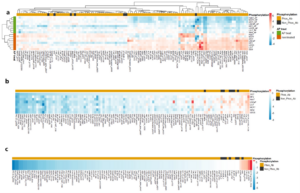Refining RPPA Techniques for Accurate Quantification of Phosphoproteins in Solid Tissues:
The Reverse Phase Protein Array (RPPA) is a robust technique for quantitative proteomics, particularly useful for profiling post-translational modifications (PTMs) in finite tissue samples such as those from patients. Despite efforts to optimize tissue-based RPPA applications, technical challenges remain, including the validation of RPPA-applicable antibodies, which is crucial for accurate quantification.
In a recent study, researchers have addressed this challenge by developing a RPPA-based phospho-antibody characterization approach to systematically quantify phosphoproteins in solid tissues, crucial for biomarker identification and validation. The suggested workflow utilizes an alkaline phosphatase (AP) compatible lysis buffer for antibody screening, setting it apart from traditional RPPA procedures. By applying this method to fresh frozen (FF) and formalin-fixed, paraffin-embedded (FFPE) tissues, they tested its applicability and effectiveness.
The arrays were precisely spotted using a GeSiM Nano-Plotter 2.0, ensuring high accuracy and consistency. Through the screening of 106 phospho-antibodies, the researchers demonstrated that AP treatment could serve as an independent factor for rapid phospho-antibody selection, showing high reproducibility and specificity in clinical specimens.
These findings establish an efficient workflow for phospho-antibody characterization using RPPA, making significant strides in tissue-based proteomics. This novel approach holds great promise for clinical assay development.

Taken from Fig 1: Assessment of alkaline phosphatase treatment induced effect across 8 cell lines versus non-treated controls. (a) Unsupervised hierarchical clustering of lysates generated with AGLyse with or without additional AP treatment across 8 cell lines (SEM, LX-7, U2OS, HFC, LNCaP, 293T, MCF7 and Huh7). Phospho-antibodies are marked in yellow and total antibodies (non-phosphor) are marked in black.
This article is based on the following publication:
Wang, N., Zhang, L., Ying, Q. et al. A reverse phase protein array based phospho-antibody characterization approach and its applicability for clinical derived tissue specimens. Sci Rep 12, 22373 (2022). https://doi.org/10.1038/s41598-022-26715-9
